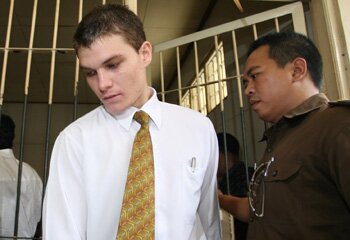
SCOTT Rush . . . his sentence has been upgraded to death.
|
Peter G Johnson, Mirko Bagaric and Richard Edney - September 08, 2006
THE news from Jakarta that four other members of the Bali Nine have joined Myuran Sukumaran and Andrew Chan in being sentenced to death raises the horrific spectre of a mass execution of Australian citizens.
Some Australians are still unsure about the appropriate fate for the Bali Nine. Should people who deliberately take risks be required to wear the consequences if the risk eventuates?
There are two important conflicting principles at play in this debate. The first is the notion of personal responsibility. People should take responsibility for their actions. This plays a vital role in controlling human behaviour. If the concept of personal accountability was removed, people would lose the main pragmatic reason for not engaging in conduct destructive to the interests of others and themselves.
Responsibility is intricately related to knowledge. Following media saturation of the Schapelle Corby case, there can be little doubt that the Bali Nine knew of strict penalties for drug offences in Indonesia.
However, personal responsibility has its limits.
We are not expected to wear the full brunt of all the risks that we knowingly take. Thus, as a community we feel sympathy for journalists killed while reporting in war zones.
This is because there is a principle that trumps personal responsibility. It is known as the principle of proportionality. This is the view that benefits and burdens should be distributed with regard to, and commensurate with, a person's merit or blame. This has a strong role to play in ensuring that we live in a just and fair society. If benefits and burdens were randomly distributed we would have little reason to strive hard to succeed or to avoid engaging in harmful conduct.
The proportionality principle is reflected in the notion that the punishment must fit the crime. Excessive punishment, even where the offender knew of the likely penalty, is unfair and cannot be tolerated by a society that has claims to moral enlightenment.
Thus in Australia sanctions dished out to criminals are normally done so in measured doses. People who drink-drive are normally put off the road for a year or so, petty thieves get a small fine.
While the principle of proportionality might be grey at the edges, it is sufficiently precise to inform us that being killed for trafficking drugs is unfair. The most severe forms of punishment should be reserved for the most heinous forms of offending. Drug trafficking is bad, but clearly crimes such as murder are far more serious.
Moreover, the principle of proportionality is not a culturally relevant, provincial rule. It applies across all cultures. All people have the right to be free from the infliction of pain. By its very nature, punishment hurts and if you want to deliberately hurt another person, you need a justification. This applies no less in Indonesia than it does in Australia.
Australians caught with drugs overseas are irresponsible but they are no less worthy of our concern and assistance than Australians who through foolishness run into other forms of trouble.
Irrespective of people's views about the level of culpability displayed by the Bali Nine, there is one unique aspect of their case which heavily militates against the imposition of the death penalty. The Bali Nine were only apprehended after a tip-off from Australian Federal Police. Given that Australian authorities instigated the investigative phase of the case, Australia should have a role in deciding the ultimate outcome.
The legal process in relation to any offending behaviour is a continuum, which commences at the investigative phase and ceases when the offender is sentenced.
In relation to transnational offences, there is sometimes an unavoidable and desirable involvement by one country in the legal process of another country. Where one country provides information to another country regarding a crime being committed in the second country, the first country has by that fact become involved in that case. This principle gives Australia a legitimate say in sentences imposed on the Bali Nine.
Not only would the Bali Nine almost certainly not have been detected without the information being provided by the Australian officials but ultimately Australian authorities will to some extent be held accountable by Australian citizens for their fate.
This means that where an offence is detected as a result of international co-operationthe matter must be resolved in a manner that gives weight to the legal standards of both countries.
This is in contrast to situations where an Australian citizen is apprehended overseas solely as a result of the workings and operations of the legal system of the other country, as were Michelle Leslie and Corby.
In cases of transnational co-operation sentencing outcomes should, where possible, be achieved that respect the sovereignty and legal and cultural norms of both nations.
Of course, it will not always be pragmatically feasible for the sentence to respect the sovereignty and legal and normative standards of both countries. This will be the case where, for example, one country has a mandatory death penalty for an offence and the other country does not have capital punishment.
However, this is not the case in relation to the Bali Nine. Indonesia does not have a mandatory death penalty for drug offences. The most common punishment for such offences is a lengthy term of imprisonment, also the most common outcome for such offences in Australia.
This is the only outcome which is appropriate in relation to the Bali Nine. It would also ensure that future co-operation between Australian and Indonesian authorities would not be placed in jeopardy.
Peter G. Johnson OAM; Dr Mirko Bagaric and Richard Edney are lawyers acting for five of the Bali Nine
Click Here for Bali 9 Case Information
|